Dirty Kanza Owner Purchases Crusher in the Tushar - An Interview with Burke Swindlehurst
“I believe this partnership will bring a wealth of experience and resources that will enable the Crusher to march confidently into its second decade on strong legs.”
In an exclusive interview between Craig at The Gravel Ride Podcast and the Crusher in the Tushar founder, Burke Swindlehurst talks about his 10 year journey around one of the original great gravel events and the latest development involving its sale to Life Time.
This is now the second well established gravel event Life Time Events has purchased, with the first being Dirty Kanza 200. The company also owns the Leadville Race Series and the recently announced Big Sugar gravel event in Bentonville, AK.
Here's a few shots from the Crusher and the Tushar event in Beaver Utah. The Crusher course is a 40/60 split between tarmac and dirt & gravel sectors, the 70-mile course accumulates over 10,000 feet of elevation gain and affords riders the opportunity to explore the stunning backcountry of Utah’s little-known Tushar Mountains and Fishlake National Forest.
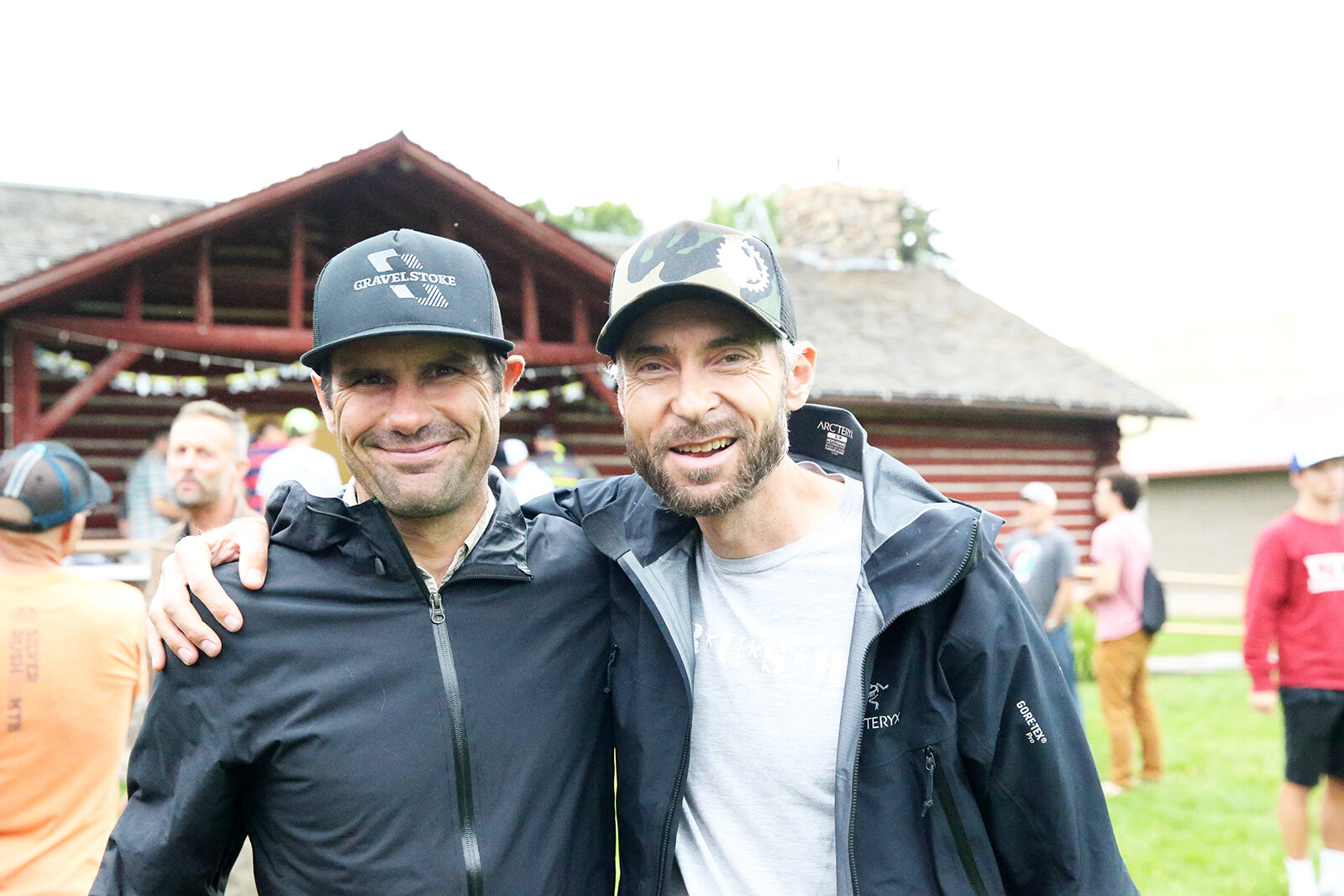
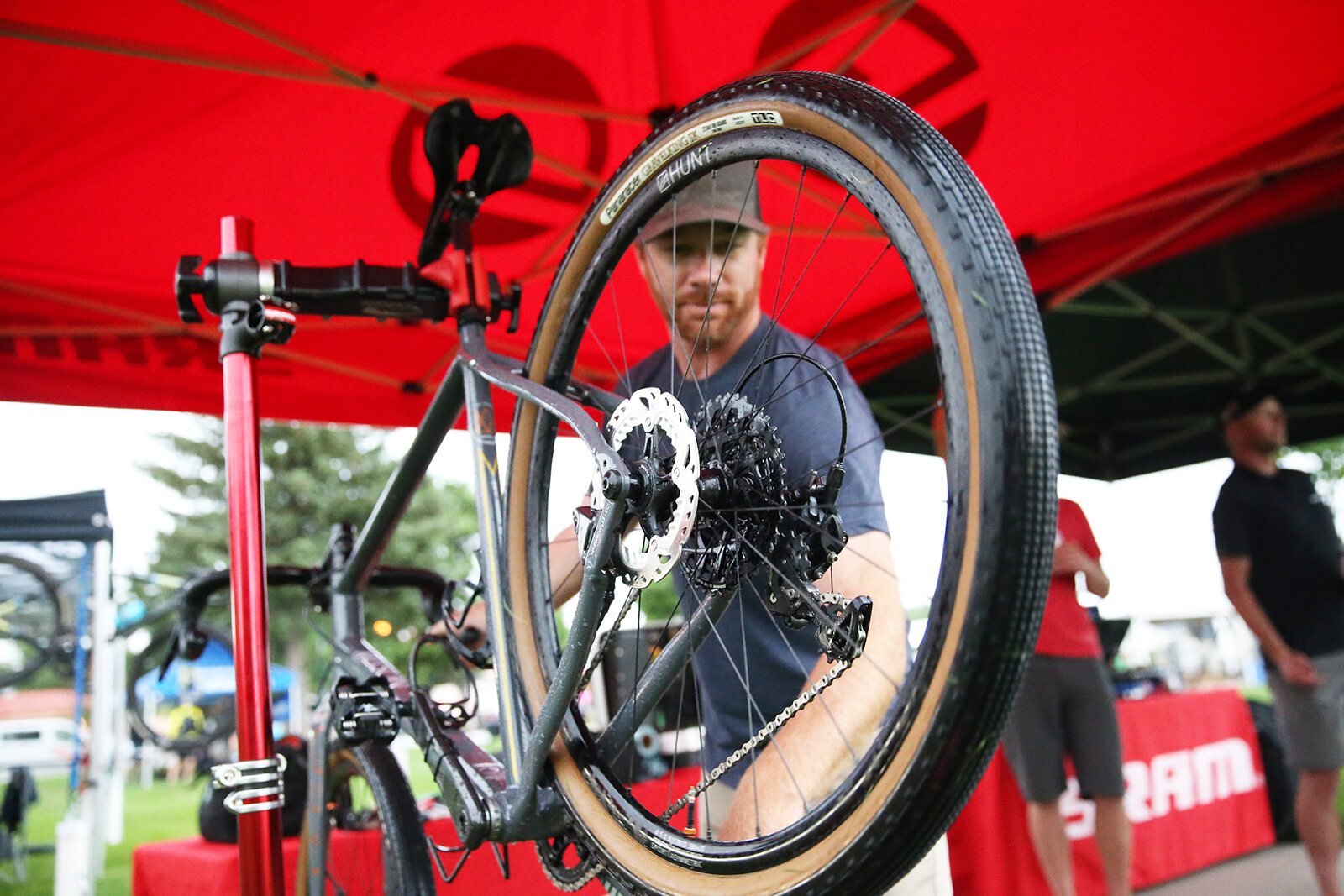
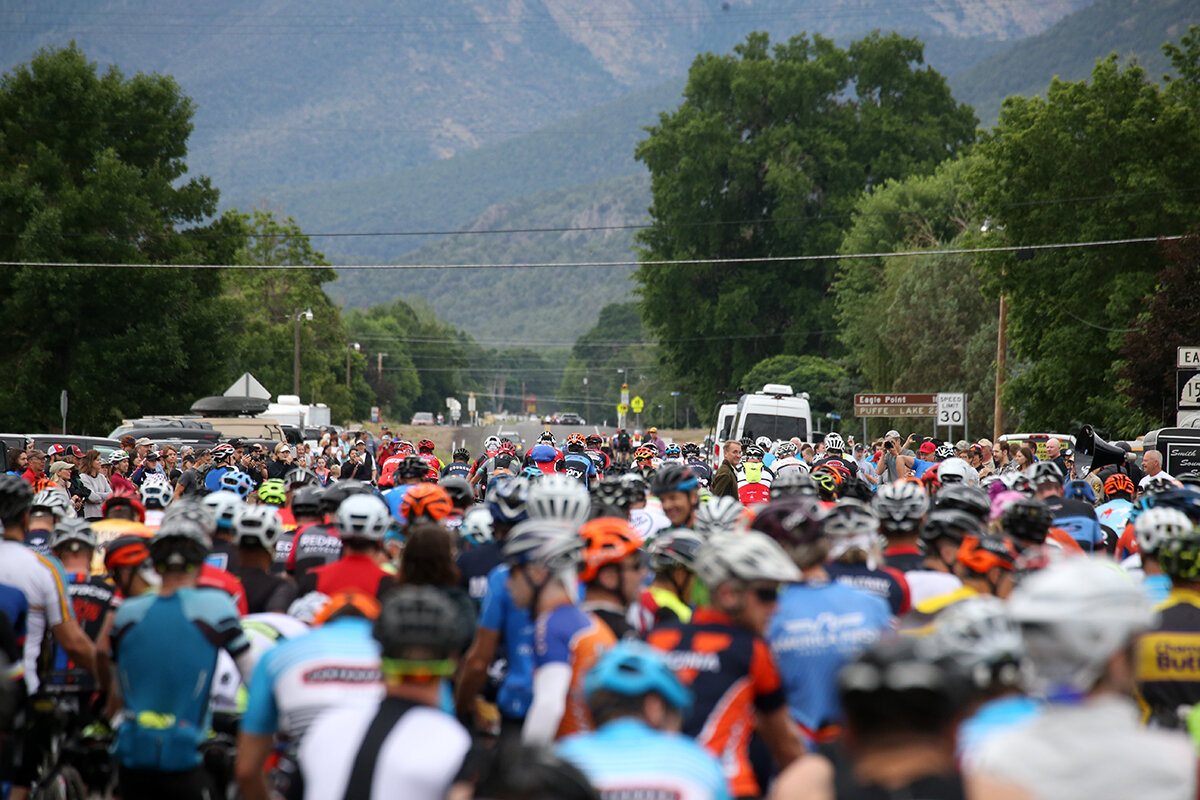
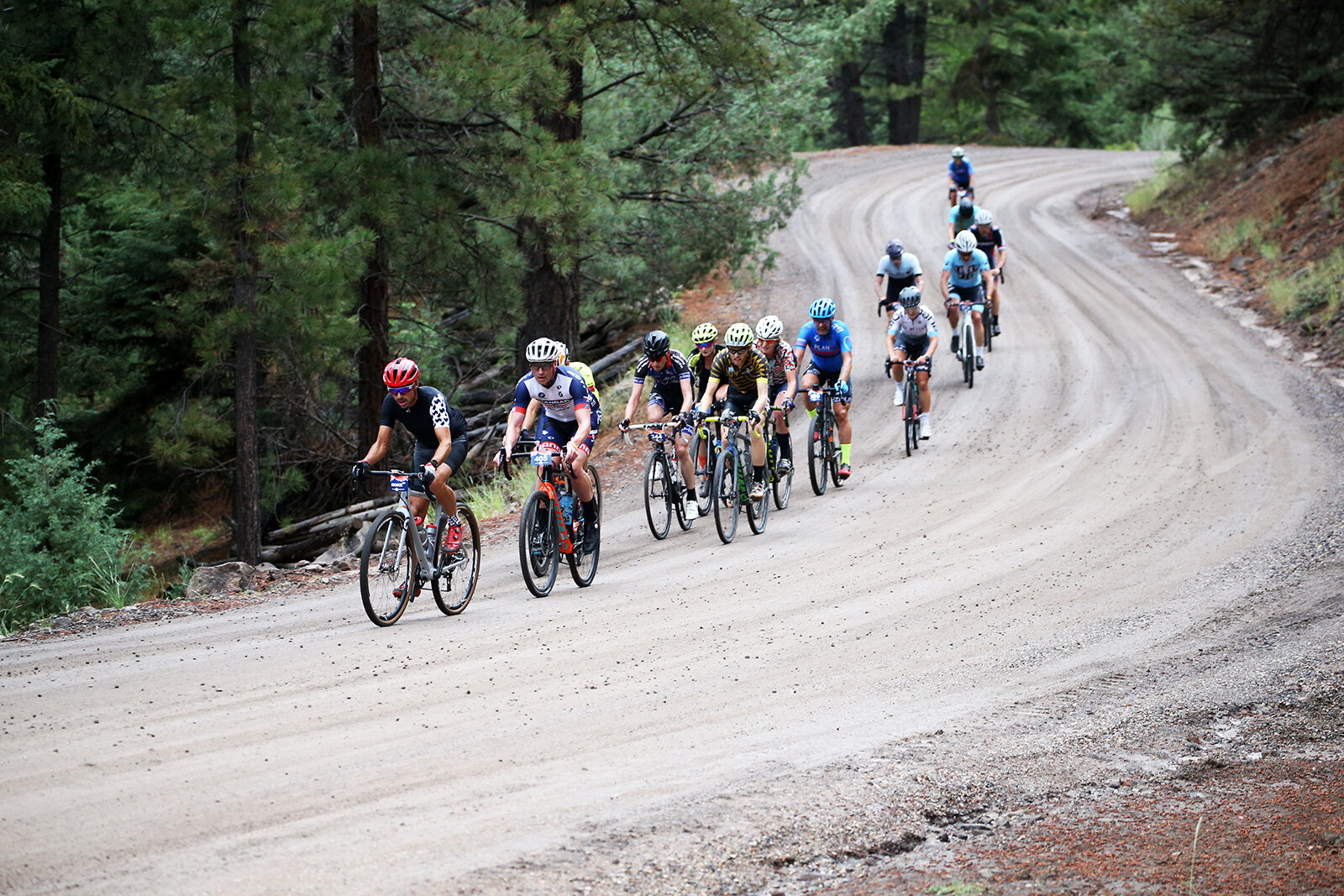

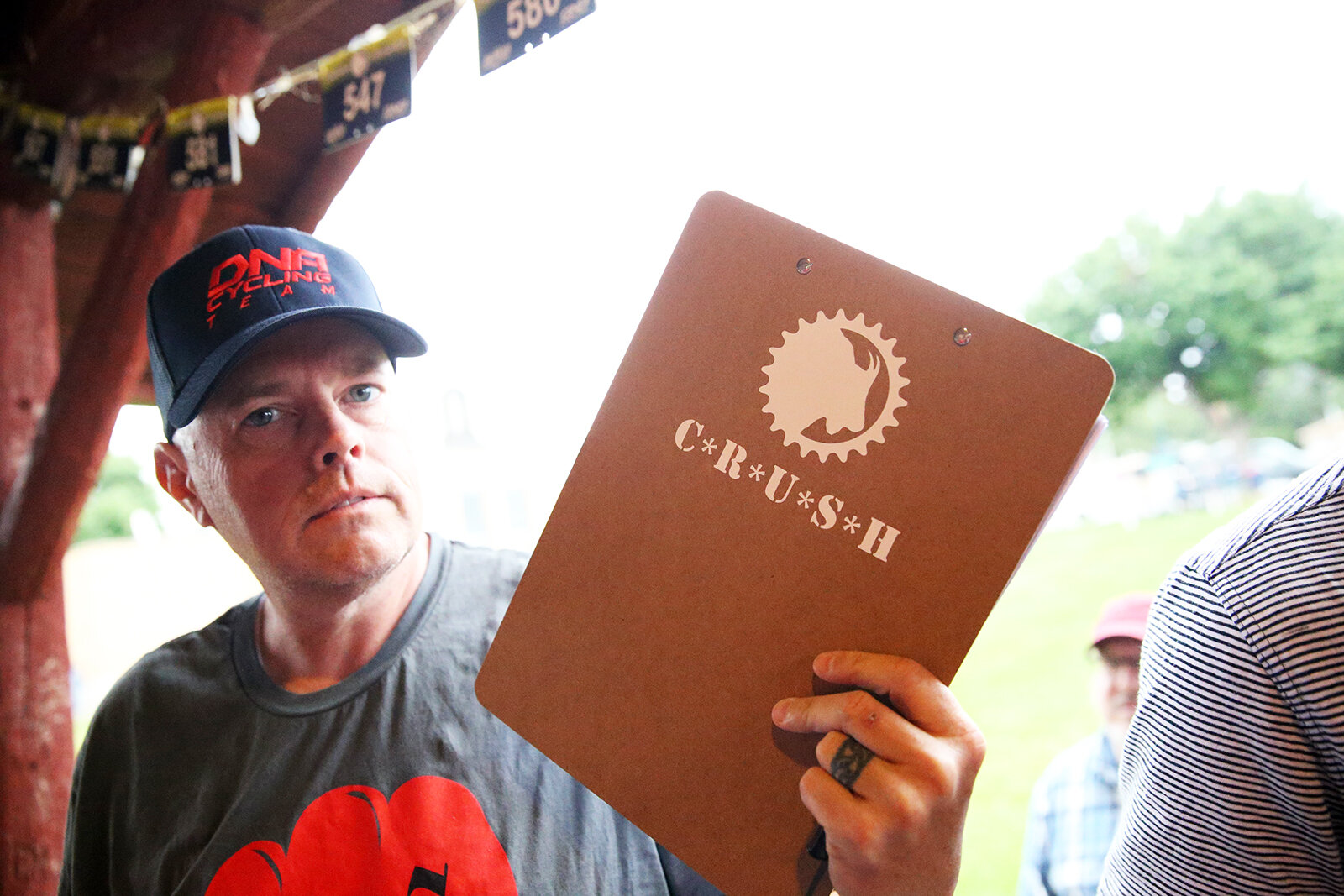
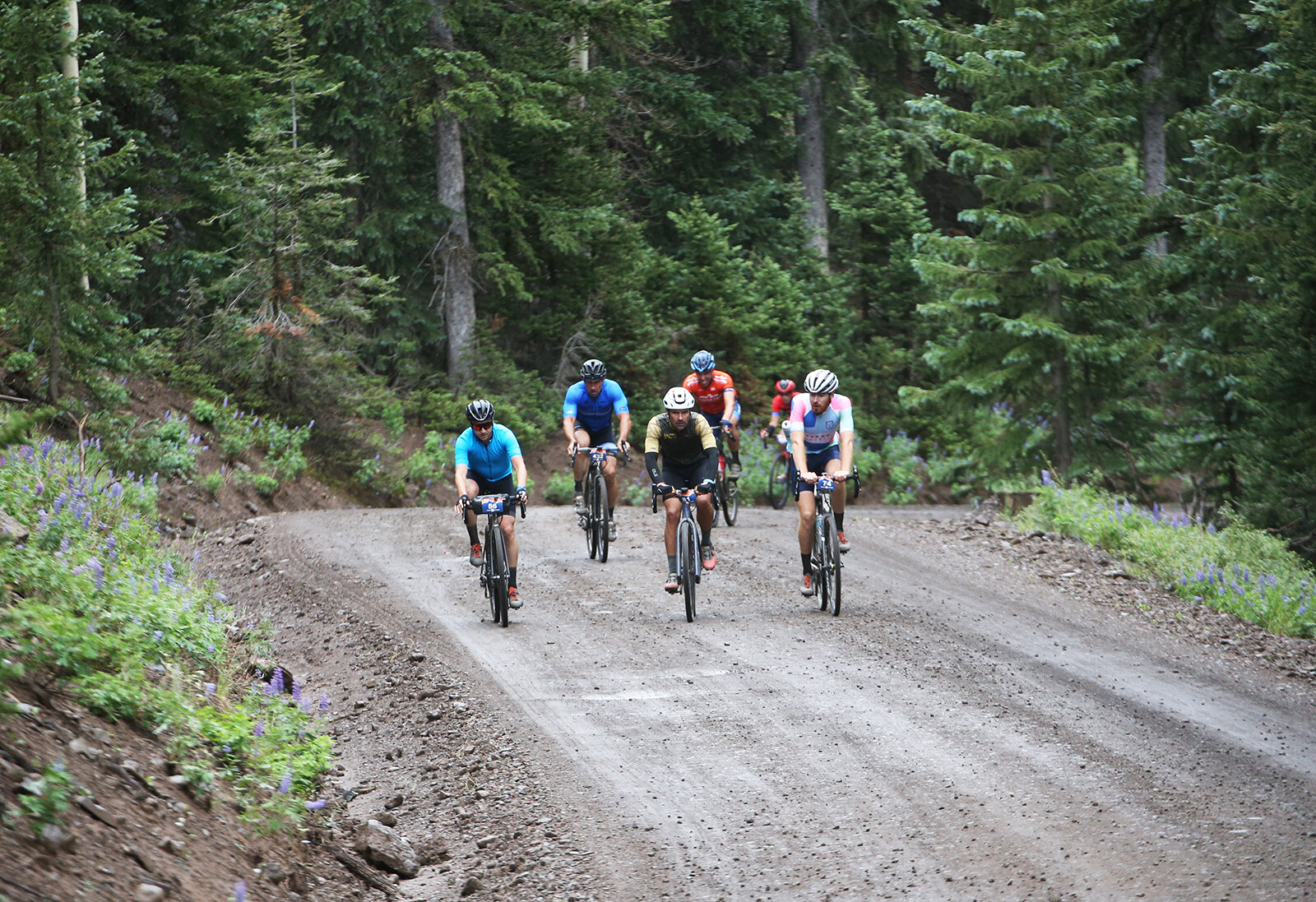
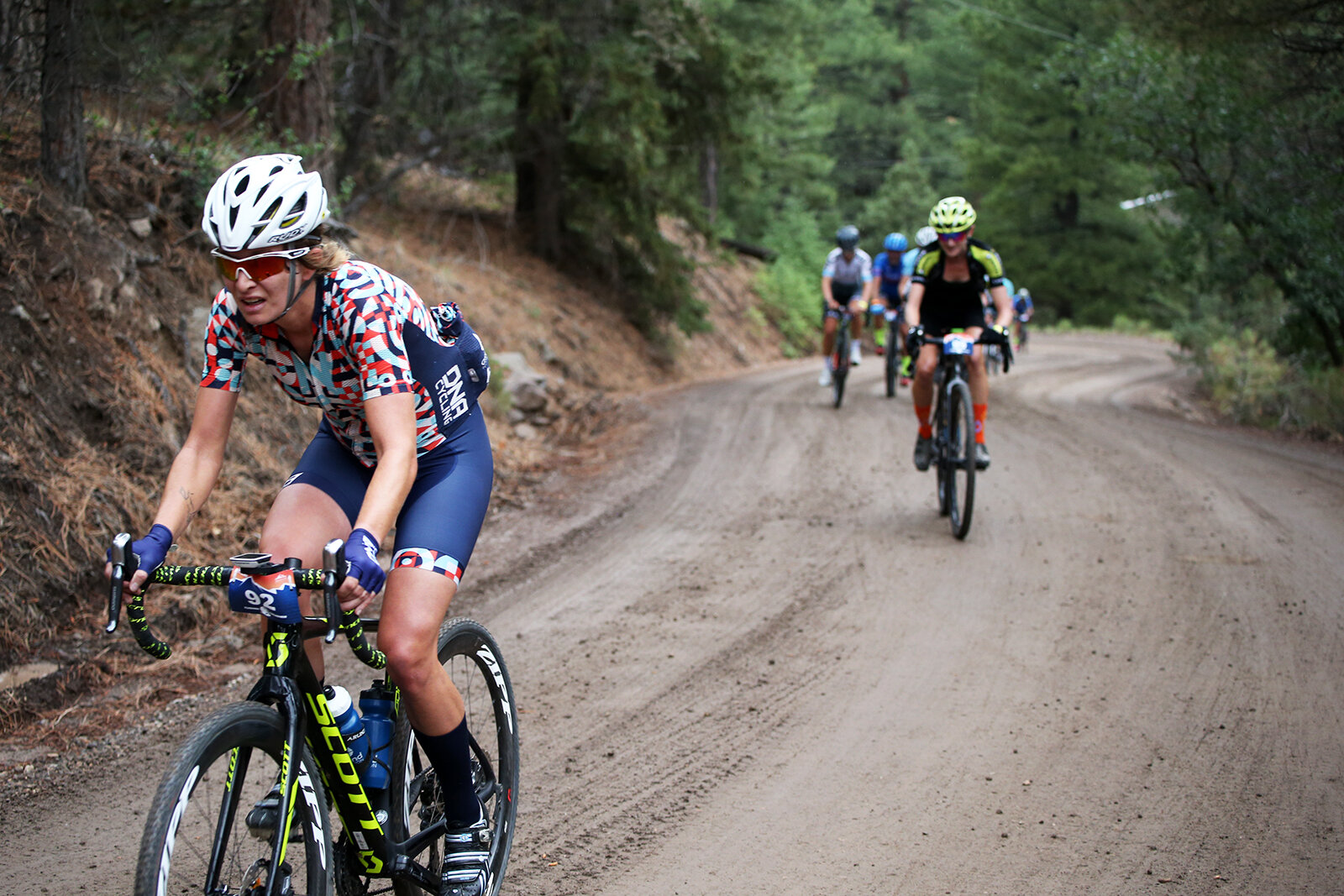
Full Transcript of The Gravel Ride interview with Burke Swindlehurst:
Greg: 00:00 Burke, welcome to the show.
Burke: 00:01 Hey, thanks, Greg.
Greg: 00:02 As is customary, always like to start off by learning a little bit more about you as an athlete. Obviously you had a professional road career, but when did you start riding drop bar bikes off-road?
Burke: 00:17 I would say probably the first time that I really delved into it was in 1996. I was preparing for the Tour of the Gila and I wanted to get some really big climbs in at high altitudes, and at the time I was living up in Logan, Utah. The training up in Logan is actually phenomenal, but they just didn't have those like massive clients that I knew I was going to be facing at Gila. And so I decided to take a trip with my buddy and we actually just packed credit cards and a change of clothes and just started riding from Logan to ... The ultimate destination being Beaver, Utah, which is where I grew up, and knowing that we were going to be climbing some big mountains on the way and also taking in some gravel roads.
Burke: 01:03 But it's funny because, I mean, that essentially was where the Crusher was born because our final day, we rode up out of the Paiute Valley, which is on the backside of what is the Crusher course now and we actually rode up what is now called the Col de Crush, the big, defining climb of the race. That's when things started to click in my mind about how cool and how much fun it is to basically ride a road bike on gravel. Primarily, you know, not just the experience of what it takes to actually ride a road bike on gravel, the skills and all that stuff, but mostly the places that it takes you. It's off the beaten path and that really spoke to me.
Greg: 01:51 Yeah. I think there's something amazing about when you put together your first mixed terrain ride, about the sense of adventure you felt. You may end up from point A to point B in a radically different fashion than you ever did on the road.
Burke: 02:06 Yeah. And nine times out of 10, there's going to be some sort of calamity in there too. And that's part of the fun is you get a flat tire or you go off course, whatever it happens to be. Like you said, there's a sense of adventure involved that arises from taking those roads less traveled.
Greg: 02:27 Yeah. I got to imagine that that's been a big driver for the industry as individual athletes discover those things about the types of riding they can do and the thrill you have at the end of it all.
Burke: 02:38 Yeah.
Greg: 02:40 In 2010 I guess, it was you and your wife founded the race known as Crusher in the Tushar. Can you talk about why you started the race and what the original vision was?
Burke: 02:52 2010 was the end of the final year of my professional cycling career, and I was 37 years old. Honestly, I'd been thinking about retiring from cycling for a while just because physically it was just becoming a tall ask by that age. But I found a way to extend it and started to actually have a lot of fun with it. But I knew by the middle of the 2010 season, I'm like, "This is it. I can only hit the ground so many times, and I'm not getting up the same way that I used to." It was one of those, "Oh, shit," moments. It's like, what's next? At the time I'd been working with the Tour of Utah and I'd been volunteering with them for probably five years up to that point. I think I started in 2005 with them, and had been doing course design and I was like the athlete and team liaison.
Burke: 03:51 It eventually evolved to the point where the race director asked if I would like to come on and be the assistant director for 2011. I'm like, "Yeah, that sounds awesome. Here we go." How perfect is that? You get to transition from being a bike racer straight into something that you know, and a world that you've occupied; just you're kind of on the other side of the barriers to a certain extent. And so, that was the plan. As things evolved, in the off season, my last race was the Tour of Utah. That was my last finish line up there at Snowbird. Crossed the finish line and it's like, "All right, I guess I'm the assistant director now." So, start working on that.
Burke: 04:35 As we started traveling down that path, there was talk like, "Hey, we want to take Tour of Utah to the next level. That would be a UCI event." And we started going down that path and we realized pretty quickly that, "Well, we're going to need to ..." It's all about scaling up and bringing in the resources it takes to be able to do that sort of thing. And I realized, "Well, I don't have a whole lot of experience in that arena." Putting on an NRC event was certainly something that I'd gotten a feel for over the years working with them, but doing the UCI thing was a whole nother level, and it started to become pretty apparent to me that there were going to need to be some other people brought in that had a lot more experience than I did.
Burke: 05:21 Eventually, we were able to get medalists to come on board and I just started thinking, "Well, this isn't really panning out for me in terms of what I had envisioned for working with the event." I was super happy for the Tour of Utah because when I was racing in it and doing that, that was always my ultimate vision for the race was for it to be a UCI event. And so, it was with a little bit of sadness that I realized, "Hey, I'm going to have to step away from this and make room for people that have a lot more experience in this than I do." That's when I started going back to that bike ride in 1996 when I was thinking, "Man, how cool would it be to have a bike race that was free of constraints from the terrain or the surface or even a sanctioning to a certain extent?" And the Crusher just started to rapidly evolve. I mean, I'm talking in the course of a week, I went from having it be this idea that had been just floating around in my mind to, "All right, I'm hitting the throttle and doing this."
Greg: 06:25 That's an amazing story. I hadn't heard that part of your background before. To have the knowledge that your own personal limitations at the time may have not been the appropriate resource for the Tour of Utah is pretty amazing, actually, that you understood that and you sent them on their way and you turned it into something new with the Crusher in the Tushar.
Burke: 06:47 Yeah. I mean, I guess now that you put it like that, for me, it felt ... I don't know, I guess one of my greatest strengths and weaknesses is the fact that I never want to let anybody down. I felt like I was going to be putting myself in a position to let people down. And that really scared me because when I sign up for something, I'm all in and I want to be there start to finish. I realized pretty quickly that I had a lot to learn and I just didn't want to put myself in that position. I never want to let anybody down. That's something that to this day still drives pretty much every decision I make in my personal and professional life.
Greg: 07:28 With the original Crusher course, has it changed over the years or has it remained the same every year?
Burke: 07:35 We've had the same course for each of our nine edition so far. 2011 was the first year and it's been the same course. Funny enough, though, I actually had a different course in mind when I originally started working on it. The course would have been 85 miles long and had 12 and a half thousand feet of climbing, which at the time having come off my professional career, I thought, "Yeah, that's awesome. That's going to be a hard race and it's going to take in all this cool terrain and it's going to be the most challenging thing ever." But in retrospect, that might've been a little bit too much and as luck would have it, in the winter of 2010 into the spring of 2011, we had a record-breaking snow year. Two weeks out from the event, I realized there's still five feet of snow on that course, and I had ... I mean, that was my first real test. The first big hurdle is straight out of the blocks, right? It's like, "Oh, you're two weeks away from this event and you're having to come up with a new course."
Burke: 08:45 Luckily there was another route that I had ridden in training many times. It was like I had my mind as a backup course in a worst case scenario, and suddenly the worst case scenario is happening. So I was able to implement that course. And as it turns out, I think the course that we now have and has been the course for every edition of the event is a fantastic course. It's more than challenging enough. When people heard that I had to cancel the original course, as we've come to call it, there were a lot of people that were super bummed. And then after the year's first race, they came up to me and said, "Oh, I'm so glad. I'm so glad you had to cancel that course. This is hard enough. Trust me."
Greg: 09:28 I want to take the listener back and I'm asking everyone to think about the bikes you had in your garage in 2011, because I think this is really fascinating, and Crusher in the Tushar has come up in a number of conversations on the podcast before with Nate King, with Neil Shirley, and they always sort of remarked to me about the sheer diversity of bikes that showed up in those early years. Can you talk about that? I mean, obviously the equipment was nowhere near evolved to what it has today.
Burke: 09:56 Right. Yeah, I think that first year we had ... I would say it was a pretty even split between people on mountain bikes, whether that's rigid mountain bikes or full suspension mountain bikes, and cyclocross bikes. And then the cool thing was there were quite a few what I called Frankenbikes back then, which is where people were taking, say, a 29-inch mountain bike, putting drop bars on it and just tweaking the gearing and doing all that stuff. And that was something that I really enjoy doing myself. I mean, I'd had so many Frankenbikes over the years trying to find this perfect bike for mixed surface riding that that's one of those things that really floated my boat from the geeking outside of things, trying to figure out the perfect bike to tackle any surface. And so, there were quite a few people on those bikes. And then of course now, we actually have a gravel segment and those kind of conundrums are not nearly what they used to be, but we do still get quite a few people that show up to the race on mountain bikes. And I do still see people with their Frankenbikes too. So, it's kind of neat.
Greg: 11:09 Well, let's talk through the course. If someone listening is thinking about doing Crusher next year, what elements of the course dictate that more road-style bike or a full-on mountain bike might be warranted?
Burke: 11:24 I always get this question from people like, "What bike should I ride?" Especially years ago when it wasn't quite as apparent or seemingly apparent as it is now. But I always tell them, "Ride the bike you're most comfortable on. If you're a mountain biker, you're going to feel comfortable on a mountain bike, on flat bars and maybe narrow up your tires or whatever. And if you come from a road background, you're probably going to be a lot more comfortable on a modern gravel bike." You know, I think it really does all just come down to what you're most comfortable on. And of course a lot of people are now adopting gravel bikes and adding those to their growing quiver of bikes. I've got three myself.
PART 1 OF 3 ENDS [00:12:04]
Burke: 12:03 The growing quiver of bikes. I've got three myself and of course in addition to mountain bikes and fat bikes and road bikes, although honestly I don't ride the road bike that much anymore, the gravel bikes replaced that for me, but-
Greg: 12:15 There's something definitely to be said for riding a bike you're comfortable on, particularly on an event that's going to take you all day. As a more amateur athlete, you really got to be concerned with just overall body fatigue and comfort and safety.
Burke: 12:28 Yeah and I think a lot of times if I had to pinpoint a couple of things that are critical to success at Crusher, tires of course and gearing. I mean, those are probably the two most critical components. Everything else is a distant second and third, but having tires that are going to stand up to the course and provide comfort and stability and of course having the gearing to tackle some of those climbs and it's funny when people look at the course profile, it really doesn't look that intimidating on paper. I don't know how many times I've heard people say that, "Oh, this is so much harder than it looked like on the website," and you get up the cold to crush. It's not the steepest or the longest climb in the world, but it's not far off either and it's all travel and when you've got 45, 50 miles in the legs and you've already got 5,000 feet of climbing and you hit that thing, it takes on a whole new dimension.
Greg: 13:32 Yeah. I think what's stark in the course profile is you've just got these two big climbs and that's it. That's the day.
Burke: 13:40 Yeah. I always say it's up hill both ways.
Greg: 13:43 And then unlike some of the more 100% gravel events, this event is more mixed, right? In terms of pavement versus gravel.
Burke: 13:52 Yeah. I mean, you hop on and off pavement and gravel throughout the event, which is, for me, one of the fun parts about the event. I always enjoy that. I've done a lot of events that are just strictly gravel and of course I've done my share of road racing, but to be able to intersperse the two, you're suddenly going from thinking about keeping it upright, coming down a washboard gravel descent to all of a sudden you're in a super tuck on a road portion and then you're having to think about group riding dynamics to make sure that you're in a group on a flat, windy section. Then suddenly you're back on the gravel again.
Greg: 14:29 Yeah. I got to imagine the rollout on the road becomes quite spirited.
Burke: 14:33 You know, it's funny because from year to year, I think the very first year when nobody knew what they were signing up for, it was extremely spirited. I mean, people were just going for it and now that the reputation of the race precedes it, there are definitely people that still like to get after it right from the gun, but I think the words gotten out like, "Hey, this race is one on the backside of the course and if you're smart, you're going to save some matches for that."
Greg: 15:02 We talked a little bit offline about how I think about course design and event production almost as an entrepreneurial journey. What does it take on the day of the event and leading up to the event? I got to imagine as the race has grown, it's taken an enormous amount of your time and energy and effort to just produce this thing every year.
Burke: 15:21 Yeah, it does and I should say, fortunately I had no idea what I was getting myself into because if I'd been able to look into a crystal ball and seeing the amount of time, energy and work that goes into it, I may have looked at something else to do, which I'm glad I didn't. I really love this. It's just become my child, but yeah, it is an enormous amount of energy, work and passion goes into it. So much so that it's not uncommon for me like when I raced professionally, my race weight was 146 pounds every year. When I step on the scale the day after the crusher's over and it's not uncommon for me to see 134 to 135 pounds because I basically don't eat or sleep.
Burke: 16:06 I just get so stressed out that it's like my wife comes home from work and she's like, "What have you eaten today?" And I'll look over at her and be like, "Uh, okay." So, it's definitely been exhausting and honestly it does get tougher over the years too. I started when I was in my 30s and now I'm on the wrong side of 40 and it definitely... It's a whole different animal 10 years on because the workload hasn't reduced, but I'm 10 years older.
Greg: 16:42 Yeah and in many ways I imagine the expectations are even higher each year as riders come back to the event.
Burke: 16:48 They are and those expectations I place on myself too. Every year the event sells out a little quicker and people are like, "That's so cool," and me, I'm thinking again, it's like I don't want to let anybody down. The quicker it sells out, the more expectations I feel. So, every year I just feel like a little bit more pressure to perform and make sure that everybody has a good time, whether it's the racers, the volunteers, all my friends and family that pitch in to help out. Just I feel this responsibility to all of them to make sure that the events and me personally, that I live up to their expectations.
Greg: 17:26 From talking to a bunch of athletes who have participated in the event, you've delivered year after year, the course, the experience, it's one of those events that it sells out fast because it's fun. It's great. People want to go back and do it time and time again. So, I mean that's a huge accomplishment to you and your team.
Burke: 17:45 Well, thank you.
Greg: 17:45 We're here today for two reasons. One, I've always wanted to talk to you about the event and learn the ins and outs, but two, this year and the end of after last season, it sounds like you came to a crossroads about what the future of the event was going to look like. Can you talk about where your head was at and where we're going?
Burke: 18:04 Yeah. Actually I was thinking about this today, reflecting on it and trying to figure out when that moment was and I want to say in 20... It was 2017, was a year that we experienced a lot of just crazy weather. It was the first year when there was literally a 60 degree temperature swing out on the course. There were parts of the course that were people's garments said they were registering over 107 degrees and then those same people that were dealing with heat exhaustion, they get up to the 10,000 foot mark near the finish line and suddenly there's hail and rain and even some people said snow, I didn't see the snow myself, but I've heard people swear it was snowing on them and I was a total wreck at the finish line because I've got my people, the search and rescue on their computers saying, "Hey, we've got lightning strikes hitting all around here," and we're talking about our contingency plans for keeping everybody safe.
Burke: 19:07 That day was just such an emotional roller coaster for me and the funny thing was is that I was so worried that people were going to be critical of something that I have no control over. Obviously the weather and I'm getting people coming across the line and I'm expecting them to wanting to just get up and get out of town and they're like, "That was the most epic one ever." I mean, they were super excited and I was like, "Awesome," and it's funny because I have to take myself and put myself back in the position of an athlete and how I would've felt and I probably would've had the exact same reaction after putting myself through that. Just the sense of accomplishment, but from a personal level, I remember we cleaned up the course and it's about 7:00 PM and I'm finally getting off the mountain and we're due to... I'm supposed to meet up with all of my crew for dinner in Beaver and I literally drive to the restaurant when I see everybody's cars there and I see my crews in there, there's riders in there and I'm just like, "I can't do this right now."
Burke: 20:12 I'm just so emotionally and physically tapped out, I couldn't do it and I remember getting the car, I drove 15 miles west of Beaver to, there's a cool reservoir out there I like to fish on sometimes and I went out to this reservoir and I sat down and watched the sun go down and I cried for, I don't know how long, it was just this catharsis and I didn't know why I was crying. I just knew that I was at my emotional limit and I remember thinking, "Okay, year 10. You can make it to year 10. Get 10 years in, you can do this," and suddenly my focus was on year 10 and then I couldn't imagine going past year 10 and even getting to that was like, "You can do it, just make year 10," and so, it's been this thing where last year I started having a conversation with some colleagues and opening up to them and saying, "Hey, 2020 is probably going to be it," and everybody's like, "Why?"
Burke: 21:15 And I'm like, "I can't keep doing it," and I'm also not the person to go out like you and I were discussing offline, building up a big crew with employees and again, all those expectations are just too much for me to get my head around and so, I was discussing this with my colleague and he's like, "Well, hey, have you ever considered selling your event?" And I'm like, "No, I haven't," and we started that discussion.
Greg: 21:47 Thank you for being so honest about the journey because I think the listener, the athlete and other event organizers really need to know that that's truth. That's what really happens. I know you put so much energy in creating this event and it snowballed into this amazing thing on the calendar every year that riders look forward to and I can only imagine you felt a tremendous sense of responsibility to create this thing every year in Utah that athletes can return to like summer camp.
Burke: 22:20 Yeah, totally.
Greg: 22:21 So, you're there, you want the event to have a future, but you're just unsure that you can't do it in the same infrastructure. So, where are we at today? What is the future for Crusher look like?
Burke: 22:34 Well, like I said, I had these discussions and I've leaned so hard on friends and family over the years and I knew that there's a limit to how much they can put in too. I have my best friend, his name's Jason Binem, he's been my right hand man for years and years and we had this discussion in the car last year and I said, "Hey, what's it going to take for you to slow down if we want to keep doing this?" I'm like, "Basically, what's it going to take for me to know that you're still going to be here and helping me every year?" And he's recently had his first child and he looked at me, he's like, "Man, you can't put a price on me being away from my daughter for a week," and I thought, "That's true."
Burke: 23:21 I mean, I totally get it and I totally respect it and so, that got me going down the road of thinking about, "Okay, what would it look like to hand the reins over to somebody else?" And again, going back to this colleague, he said, "I can put you in touch with some people," and so, I started tentatively dipping my toe into talking to some other organizations that had expressed interest in becoming involved in partnering with Crusher. One of those people that he suggested I reach out to was Chemo Seymour at Lifetime Fitness and so, I got on a phone call with Chemo in May and we just started talking about what that might look like.
PART 2 OF 3 ENDS [00:24:04]
Burke: 24:03 Kind of just started talking about what that might look like, and I certainly wasn't ready to just say, "All right, let's do this thing." Like I said, this is the closest thing to a child I'm probably ever going to have, and the thought of handing that over to somebody is daunting. But through the course of this process, I realize it's kind of almost like a graduation. It's like raising a child and then it hits 18, and it's like, "All right, it's time to go to college. It's time to scale up and grow up, and I'm going to open the door and let somebody else have a hand in your growth." And that's been interesting for sure.
Greg: 24:44 Today, you're essentially announcing a new partnership with Lifetime Fitness.
Burke: 24:50 That's correct. Yeah. I'm super excited about it. Kimo, we talked off and on for a couple months and then he came out to Crusher, and Jim Cummings, I'd actually been speaking with him a bit too. Even prior to all of this, I've reached out to Jim in the past, Jim at Dirty Kanza. And we've talked about just kind of things over the years regarding gravel and the evolution and growth of it, and also I kind of see him as like a... He's a great sounding board, and so when I've run up against some problems, he's kind of one of the people that I'll call and say, "Hey, I've got this going on. What's your opinion?" Anyway, yeah, Jim was supposed to come out. Unfortunately he wasn't able to make it, but Kimo came out, and I had Kimo hop in the car with me and we spent the day together at Crusher, and kind of got to know each other a little better person-to-person.
Burke: 25:47 And he said, "Hey, why don't you come out to Leadville? Come out and see how we do things, and we can kind of go from there." And he's like, "If you want to, you can ride it." I'm like, "Oh, I'm going to ride it." I've always wanted to ride Leadville, and so now I've got this opportunity to go out and kind of see how Lifetime does things at their events and also participate in the event. For me, that was a game changer. Actually getting out to Leadville and seeing how they do things, and also just seeing how much of the authenticity that remains from the founders, Ken and Merilee. They're there. They're still front and center, and realizing that that's kind of how Lifetime wants to do things. They want to maintain and keep in place the founders of the events, and make sure that authenticity and kind of what made the event what it was in the first place is never diminished or taken away.
Greg: 26:48 Yeah. I think that's really special, and I've seen it too with all the sort of race organizers that I've met that have been involved in the Lifetime family. They're able to sort of supercharge their vision, and in many ways ensure a future for their original vision that isn't as all-encompassing in their personal lives as you just described.
Burke: 27:11 Yeah, yeah. Yeah. I mean, it was really cool. The other great thing about Leadville... I went there. I was determined not to drink the Koolaid, so to speak. I'm like, "I've got my skeptics glasses on, and I'm going to pick apart everything that I don't like about how they do things," and that's just naturally how I am. I kind of operate off worst case scenario. And so I got there determined to kind of find things not to like, and after... Well, first off, I met Bahram Akradi. He is the founder of Lifetime Fitness. I met him at Leadville and realized, "Oh hey, this guy, he's here. This'll be his 10th Leadville." He's not just a businessman, and he didn't just start Lifetime Fitness. This guy is a bike rider, a legit bike rider. He's going after his big buckle, which they give for people that have finished 10 years.
Burke: 28:14 And then of course I find out the next day Kimo's lined up, and I find that Kimo actually holds the record for most number of consecutive finishes under eight hours, I believe. And so I soon came to realize these aren't just businessmen. These are people that have a true passion for the sport and for these events, and for me that was a game changer once I realized that these people get it. They live and breathe this. And then kind of the final... The thing that clinched it for me was the next day they have the big awards in Leadville afterwards, where everybody gets their buckles and all that kind of cool stuff. And Bahram got up and gave a speech, and I can't tell you exactly what he said. All I remember is that I just remember thinking this guy is like the real deal. He's a genuine human who's out trying to do good things for people. I don't know. It's really hard to explain.
Burke: 29:17 I'm sure anybody that was there and actually heard the speech would know exactly what I'm talking about, but I came away convinced The Crusher is going to be in good hands with these people. And of course one of their conditions was, " Hey, we're not interested in The Crusher unless you're going to be around." And for me that was very important to hear, because I'm definitely not to the point where I'm just going to hand the keys and walk away. This thing is still my baby and I love it. If that was an expectation on anybody's part, that was going to be a deal breaker for me, and so to hear that was quite the opposite was good.
Greg: 29:55 Really exciting to have a partner who can kind of eliminate the things about running the race that you didn't like, and allow you to focus on the things that you do like.
Burke: 30:04 Yeah, yeah. That's going to be huge. I've always wanted to have a big expo and all that kind of stuff, but I also realize, "Hey, an expo is an event in and of itself." I've got enough on my plate, let alone trying to get this other event off the ground. And so now there's going to be people there that are going to be like, "The expo's your thing. Cool." You know? And honestly, I'm just really looking forward to having enough taken off my plate that when I do get to be around the race and people come up and talk to me, that I can look them in the eye and really listen to what they're saying, and share their excitement instead of thinking about all the other things that are on my mind like, "Oh, did we get enough zip ties? Oh, I wonder if those signs migrated overnight."
Burke: 30:52 There's just all those little things that add up in your mind that, for me, made it so that I wasn't able to be completely present in the moment with those people. And that's something that I've always really wanted to do is just be able to enjoy some of the fun atmosphere that I've helped to create, actually be a part of that and enjoy it instead of be a total nervous wreck. And who knows? I mean, it's probably just my nature. I'll probably be a nervous wreck no matter what, even if it comes down to the day 25 years from now when I'm just going there and shaking hands. But I think this is a step in the right direction towards sustainability for not only for the event, but for me personally.
Greg: 31:32 For 2020, Burke, when's the event and when does registration open?
Burke: 31:39 The event, we've always put it on the second Saturday in July, and so this year that falls on July 11. And we haven't announced the registration date yet, because this has kind of been evolving and I wanted to make sure that all of our I's were dotted and T's are crossed before we announced the registration. We'll be coming forward with that here pretty quickly.
Greg: 32:01 We're going to retain the same course in the same sort of experience as years past?
Burke: 32:06 The experience is not going to change. The course, that's still up in the air. If there are any changes to the course, it's going to be, I assure you, they're going to be for the better and it's still going to be The Crusher no matter what. The [cul de crush 00:08:22] is always going to be there, but if there are ways that we can enhance the overall experience, not just for the writers but for the spectators... I mean, that's one thing I've always struggled with over the years was wanting to make sure that the people who accompany the riders to the race are also having a good time, so we're looking at ways to maybe improve that experience for everybody across the board, and that may include changing up the course a little bit. I don't know.
Burke: 32:51 But the cool thing is, is now that I do have people like the Lifetime crew here to help out, I can start thinking about that sort of stuff instead of just kind of being stuck in Groundhog Day mode because I don't have the bandwidth to really think about much else. For me, this feels like kind of unclipping my wings a bit and being able to get back to dreaming about doing some cool things, and kind of seeing the event evolve as gravel is evolving itself.
Greg: 33:22 That's super exciting. I mean, to imagine to have additional resources to kind of continue the vision forward and continue to explore that area of Utah, which for somebody who hasn't been there, it is a gorgeous area. I've been through Beaver a few times, and I can only imagine how much fun it is to ride those mountains around there.
Burke: 33:43 Yeah. Well, you need to come out and experience it yourself.
Greg: 33:44 Yeah, absolutely. Absolutely. After looking at that course profile, I realize I'm going to have to climb a bunch of hills to get prepared.
Burke: 33:50 Yes.
Greg: 33:52 Thank you so much for the time today. I think it's been super enlightening for me and for the listener, and for any other person who started an event, is in the midstream of doing a multi-year event, just to kind of think about the journey that you take. And you know, I say it time and time again when we talk to event directors. I have so much admiration for you for just taking the ball and running with it, and creating an event that is now part of a lot of people's summers. Hats off to you for everything you've done and what you're continuing to do with Crusher, and congratulations on what the future holds.
Burke: 34:29 Oh, thank you, man. I really appreciate that, Craig. That means a lot.
PART 3 OF 3 ENDS [00:34:32]
